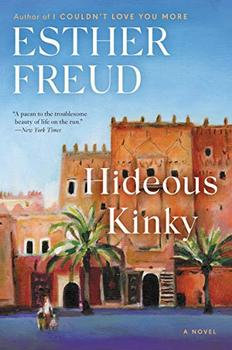Summary | Excerpt | Reviews | Beyond the Book | Readalikes | Genres & Themes | Author Bio

A Novel
by Esther FreudIntroduction
I came to reading late, and writing even later. There were no childish poems, no adolescent novels, no comprehension that any living person could ever write a book. But that's not to say that there weren't stories. My mother read to us aloud – The Arabian Nights, Tintin, Alice in Wonderland – and from the start I was caught up in the crossfire of these dramas, thrilled and terrified, reassured. Soon I began telling stories of my own. At first to myself, and then as entertainment for my sister and the group of friends we collected as we travelled across Europe to North Africa, hitch-hiking through the Atlas Mountains, making our way from Marrakech to Fez. Stories and their telling gave me a role, and I was hungry for identity; they helped to fill the in-between hours, made me useful, formed a frame for the events of our peripatetic life.
I was ten before I learned to read. Dyslexia, or possibly sheer overwhelm – my head was full of noise and colour, mirages and oases – scrambled the letters of the simplest words into unidentifiable shapes. But at school too I was saved when our teacher, with nothing but his voice, recounted tales from the ancient myths: Persian, Greek, Egyptian, Norse, as real to me as my own life. These I memorized, repeating in detail to a friend over the course of one half term the entirety of the siege of Troy: the duel between Paris and Menelaus, Hector's body dragged behind a chariot, the lamentations of his parents, Hecuba and Priam, their tears and despair. Even so, I was concerned. What was to become of me? How would my life be if I could never learn to read? I considered practical solutions: Farmer. Acrobat. Or were these jobs reserved for men? And then one day I picked up a paperback – its cover a picture of a girl, dark-haired, smiling, not so unlike me – and, after a stuttering start, I found myself drawn in. It was the story of a child declared to be uneducable, and how her parents had dedicated their lives to proving this untrue. Half an hour passed. And then an hour. I looked up to find that I was being watched, the eyes of my family, staring. I flipped a page; there were more words waiting, neat and clear. I was in. I'd found the secret, and I was never going to give it up. I could read.
It wasn't until I left education that I began to write. Sketches and songs set down, often on a bus ride, starting when I knew that time was short. My subjects were love, confusion, heartache, none of which it seemed warranted more than a page. If only I had something to write about! The profession that I'd trained for, acting, left me with time to spare and so I signed up for a creative writing class, and when I was asked to present a longer piece, I turned to my childhood, to the Moroccan adventure that we'd embarked on, my mother, sister and I, when I was five. Again, I felt all eyes on me as I described a camel festival, the terror of riding in the saddle bag of a donkey as it clipped along a mountain pass, getting lost at night on the beach at Agadir. Encouraged by the interest of the group, I vowed to continue, which slowly, laboriously, I did, tangling myself in complications, the narrative jarred with flashbacks, the structure unsustainably confused.
'Tell the story.' This was the advice I received at an Arvon course I signed up for some years later. 'Start at the beginning, and keep going to the end.'
'The problem,' I confided, 'is I don't remember enough to—'
'Make it up!' The response was stern. 'You're writing fiction, aren't you?'
Rather than argue, I went out into the garden where there was a dilapidated summer house, and wrote what became the first chapter of this, my first book. The rest might have flowed from there – I had my structure now, and it was simple – but I hadn't found that other vital ingredient. In order to write, apparently, you had to sit down and actually do it, and I still hoped this wasn't true. In stops and starts I moved forward, forcing myself to add a few more pages whenever it was my turn to read aloud to the writing group that met regularly at my flat. And so it may have continued. Indefinitely. Discipline can be hard-won. But two years later, out of work, and in a surprisingly despairing mood for twenty-six, I made a decision that the following week I'd write for three hours, every day, and I'd keep on writing until ... either I was offered an irresistible part in a play (surely!) ... or the book was finished.
Excerpted from Hideous Kinky by Esther Freud. Copyright © 1999 by Esther Freud. Excerpted by permission of Ecco. All rights reserved. No part of this excerpt may be reproduced or reprinted without permission in writing from the publisher.
Life is the garment we continually alter, but which never seems to fit.
Click Here to find out who said this, as well as discovering other famous literary quotes!
Your guide toexceptional books
BookBrowse seeks out and recommends the best in contemporary fiction and nonfiction—books that not only engage and entertain but also deepen our understanding of ourselves and the world around us.